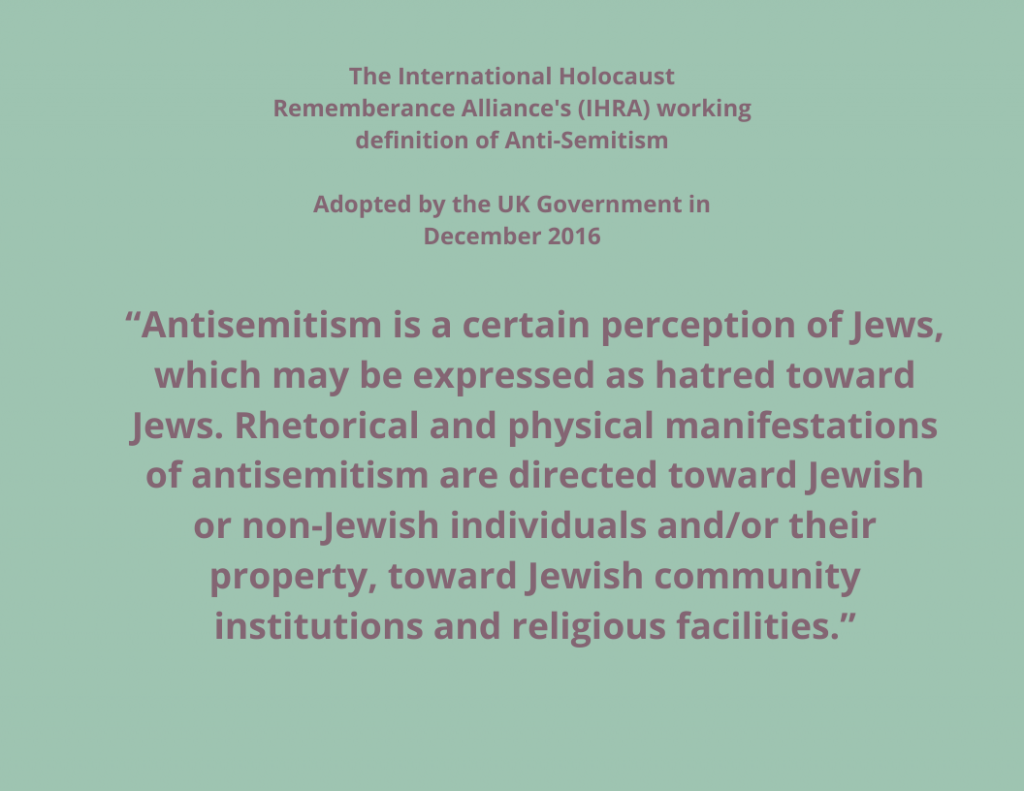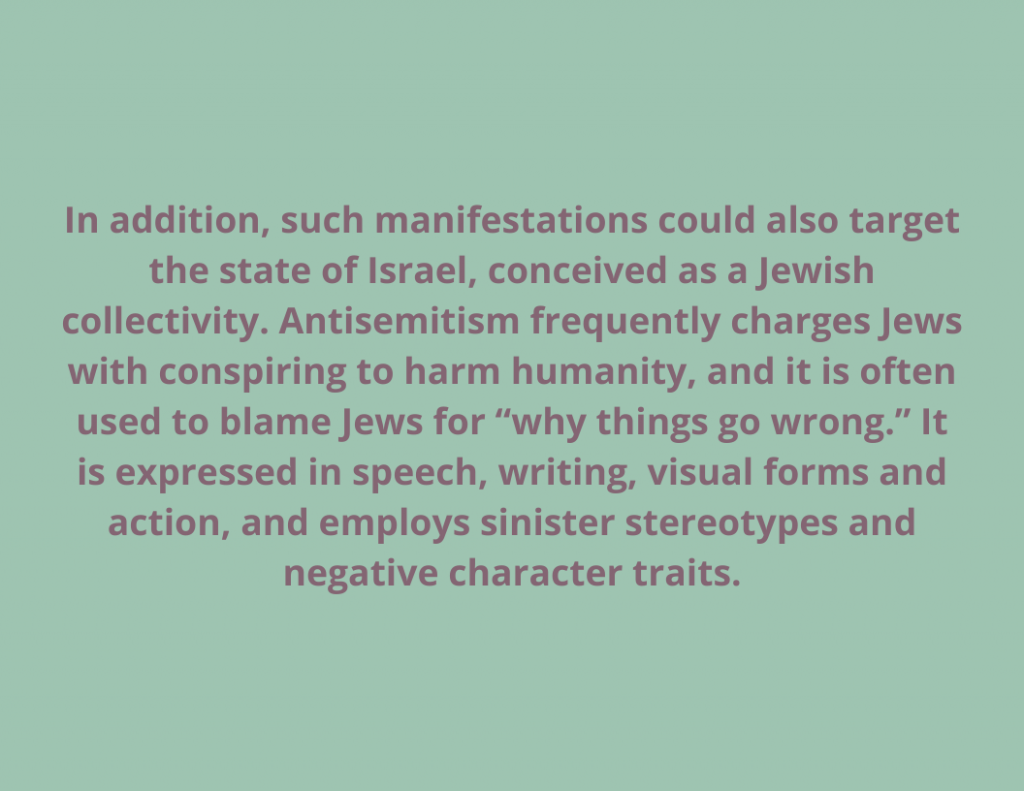Sara* is a young woman living in the UK. Like many, she has a Twitter account and logged in to be met with a barrage of online abuse. Sara is also Jewish and this wasn’t an isolated incident.
“Over the months I’ve had some horrible abuse”. The number of messages she received escalated and eventually forced her to get the police involved who treated the messages as a racially aggravated hate crime.
“When I first read these messages, I felt sick; I still can’t believe that in 2019, people are being like this but then it makes me angry”.
Britain is at a crisis point. Reports of antisemitism here and around the world are never far from the news and are on the increase. Last year alone, a Jewish man and his family were subjected to an outburst of anti-semitic abuse by another passenger on the London Underground, an elderly Jewish couple returned from holiday to find their home “ransacked and desecrated” with anti-Semitic graffiti and in Manchester, a man waiting for a late-night takeaway suffered verbal abuse and Nazi salutes from complete strangers after being asked if he was Jewish. These are just a handful of incidents but antisemitic violence and abuse is happening all the time here and across the globe
The Political Landscape
Some of these crimes have been linked to widespread discussion of antisemitism in the Labour Party. Jeremy Corbyn has been heavily criticised for not dealing swiftly with antisemitic sentiment and statements made by members in the party and has been accused of being an antisemite himself. This is an opinion that is compounded by the views of Senior Rabbi Dr. Jonathan Romain who wrote to his congregation advising that a vote for Jeremy Corbyn would present “a danger to Jewish life as we know it”
“I should stress that the problem is not the Labour Party itself, which has a long record of fighting discrimination and prejudice, but the problem is Jeremy Corbyn. Corbyn-led Labour, has at best, let antisemitism arise within its ranks, or at worst, has encouraged it.
Rabbi Dr. Jonathan Romain
The Community Security Trust (CST) monitor antisemitism and provide security for Jewish communities. They found that December brought an “intense focus” to the issue of antisemitism in the Labour Party and a spike in antisemitic activity. In 2019 they recorded 224 incidents where the antisemitic views expressed were directly related to the Labour Party or in arguments about the alleged antisemitism within the party.
The Misuse of Social Media
In Sara’s case, supportive police action definitely helped her deal with the online abuse although they were never able to catch the culprit.
“Because Twitter doesn’t offer them any help, they couldn’t find the person who tweeted me,” she said.
Sara is not alone and her experience is reflected by the latest CST Antisemitic Incident Report for 2019.
The CST recorded a total of 1,805 anti-semitic incidents across the UK in 2019. This is an increase from the 1,690 incidents documented in 2018 and means that overall, reports of antisemitism have risen by 7%. In 2019, the CST logged a total of 697 online incidents which made up 39% of the total 1,805 reported that year. This is a huge increase of 82% from the 384 online incidents reported for the whole of 2018 and shows a shocking escalation in hate crimes against the Jewish community. Most of the 697 incidents happened on social media which clearly highlights the fact that it is the biggest single influence and most obvious explanation for such an upsurge in antisemitic incidents in 2019.
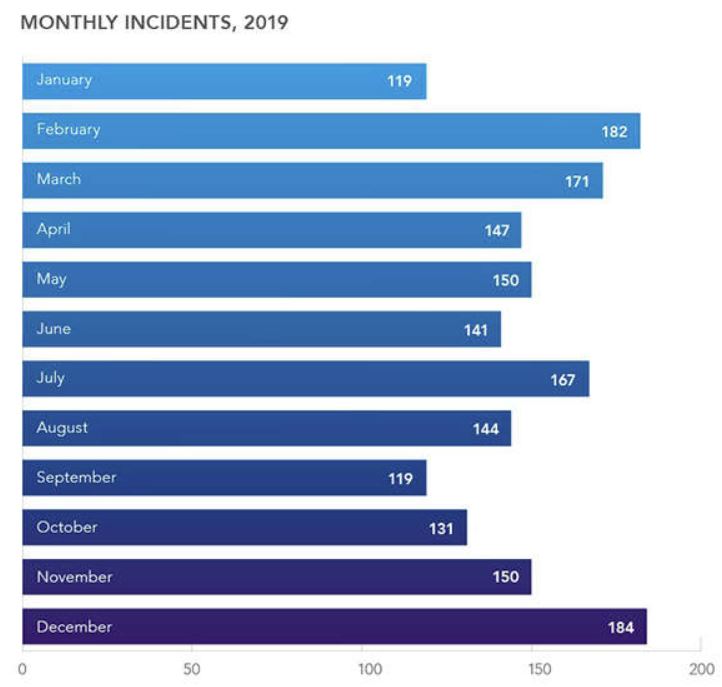
Source: CST 2019 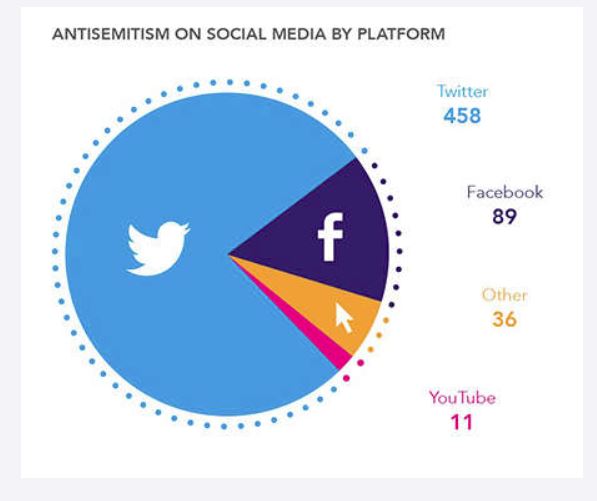
Source: CST 2019
These figures show a disturbing trend but clearly illustrate how much online abuse has spread and is frequently the means by which, those who want to, spout messages of hate.
“These totals are only indicative, as the actual amount of antisemitic content that is generated and disseminated on online platforms is much larger. In some cases, social media has been used as a tool for coordinated campaigns of antisemitic harassment, threats and abuse directed at Jewish public figures and other individuals.”
Community Security Trust, 2019.
What motivates this prejudice?
The Antisemitism Barometer is a report produced by the Campaign Against Antisemitism which includes the data from polls they have conducted annually since 2015. Their research on the prevalence of antisemitic prejudice in Britan investigates attitudes towards the Jewish population by asking a sample of British adults seven questions related to common stereotypes and conspiracy myths.
“British Jewish people chase money more than other British people.” (2015 wording: “Jews chase money more than other British people.”)
“Jewish people talk about the Holocaust just to further their political agenda.” (2015 wording: “Jews talk about the Holocaust too much in order to get sympathy.”)
The results revealed 36% believe at least one antisemitic stereotype to be true, 1 in 5 people believe at least two stereotypes and 12% believe at least three stereotypes. More information can be found here.
This exposes a shocking mindset but is the reality that British Jews live with every day. The effects are clear with almost half saying they no longer wear “outward signs of their Judaism or try not to show that they are Jewish in public”.
Dr. Abigail Gardner is Media School Research Lead at the University of Gloucestershire and has worked closely on projects with the Cheltenham Hebrew Congregation at the Cheltenham Synagogue. Abigail believes that antisemitic feeling stems from a deep-seated ignorance and history.
“It’s like some kind of underlying virus that’s there in Europe and makes itself manifest when populist politicians open that door to scapegoating people,” she says.
“It’s a sewer of ignorance and hatred that people tap into,”
These words are echoed by CST Chief Executive David Delew. Speaking to The Guardian last year he expressed his concern about the growing problem of anti-semitic activity after an increase that has occurred for three years in a row.
“The problem is spreading across the country and online. It reflects deepening divisions in our society and it is causing increasing anxiety in the Jewish community. It will take people of all communities and backgrounds standing together to turn this tide of hate around.”
What are we doing to address this?
Sara has not been put off by her recent experience saying “I’m still going to tweet about Judaism and Israel and if I get more tweets then I’ll just deal with it” The question is why should she have to?
Alan Silverston from the Cheltenham Hebrew Congregation believes the way forward lies in education from an early age.
“Part of the objective of our small community is to engage widely with the local community which we do. We have a lot of schools coming in. We talk about British Values. British Values are the same as Jewish values; honesty, fairness, toleration, rule of law – exactly the same and what you find when you talk to people is that your shared values are exactly the same”.
Alan also seeks to dispel some of the myths around Judaism by encouraging visitors to ask anything they want to know.
“What’s interesting is that a number of children have done some of this work because they have to understand a number of religions and that’s healthy. Judaism is just another religion that has similar values whereas when I was growing up if you asked people about Judaism they wouldn’t have a clue, so we have moved on enormously. We have laws about dealing with hate crime but I think, in the main, we’re a very tolerant country”.
Who are the people working to support those in the Jewish Community?
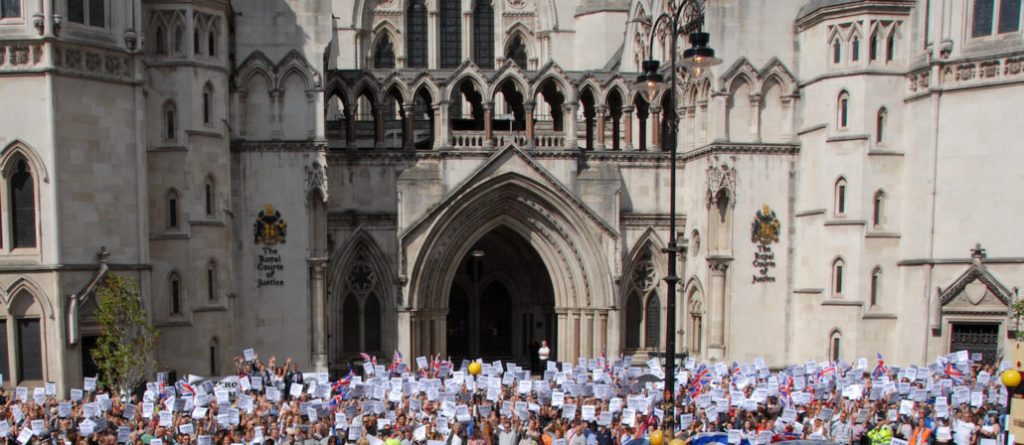
“We remember those who reasoned it’s only words, high spirits, harmless insults” Holocaust Memorial Day 2020
Antisemitism is on the rise in Britain and we cannot afford to ignore it.
Holocaust Memorial Day on the 27th of January marked 75 years since the liberation of Auschwitz.
Joan Salter MBE is a holocaust survivor. In an interview with the BBC she said,
“The lessons are so important but some of the Holocaust has become sanitised. Obviously, education has to age-appropriate but that was what the holocaust was and shows the depth of deprivation that prejudice can create and how humanity was lost.”
Has the world learned a lesson?
“No, and unfortunately prejudice is a very dangerous virus. There is always something in human beings that the ‘other’ is different. It is so important to not allow this prejudice and loose words you know, it is so important.”
What can you do?
Campaign Against Antisemitism antisemitism.uk has set up #TogetherAgainstAntisemitism so that people can show their support for the Jewish community. Please visit togetheragainstantisemitism.com for more information.
To report an incident of antisemitism please contact cst.org.uk or call the national emergency number (24 hours) 0800 032 3263
*Names have been changed to protect identity.

